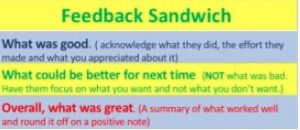Enhancing Parenting Skills with NLP
I thought that I was a great parent until my children started getting older and I faced challenges that I did not know how to deal with. Then I came across Neuro Linguistic Programming (NLP) and started to use it in my day to day life and, in particular, in dealing with my children. The most powerful NLP tools for me were its presuppositions. I would like to share a few of these with you so that they can have the same positive effect on your parenting skills as they did on mine.
NLP Presuppositions are beliefs that guide and have guided the development of NLP. They are not necessarily true, but it has been found that they produce useful results. I have practiced and adopted these presuppositions and you can too. They will provide you with tools enabling you to be an effective parent giving your child a childhood journey to remember.
1. The map is not the territory and people respond according to their map of the world.
We all take in lots of information (made up of external events) through our five senses. We then make our own internal representations which is our map of the world. This is different for everyone. This internal map we create of the world outside is influenced by what we call filters in NLP. These are our perceptions, beliefs and values.

As a parent, we need to realise that our map of the world will be different from that of our child. It is therefore very important that we can see the world through the eyes of our children. See what they are seeing, hear what they are hearing and feel what they are feeling.
This has been very useful for me with my children in understanding and relating to them as they are growing older.
2. The Meaning of Communication is the Response you get.
As a parent, the responsibility of communicating with your child lies with you. There are many times when you might have said something and your child seems to think that you said something different or misunderstood you. Do not blame your child for this. Think of a different way of communicating the same thing.
3. There is no failure only feedback
This means that in whatever you do there will be an outcome. If it is not the desired outcome, then that does not mean that there has been a failure.

As a parent, it is important to remember that when your children make a mistake or do not do a good job then you should not criticise them. Give them feedback. I love using the feedback sandwich. In a feedback Sandwich you first say What was good (acknowledge what they did, the effort they made and what you appreciate about it. You then say What could be better for next time ( NOT what was bad. Have them focus on what you want and not on what you don’t want) and Lastly, you say Overall, what was great (a summary of what worked well and round it off on a positive note)
It is amazing how well a child responds to feedback when it is given positively.
4. People are not their behaviour
This presupposition says that people
are
not
their
behaviours,
their
behaviours
are
just something
they
do
sometimes.
This is something that I found very useful and changed the way I say things to my children. For example, instead of saying “you are a naughty boy”, I now say “I don’t like the way you are behaving right now”.
We find that children sometimes behave badly because they find themselves in a situation that stops them from being the best they can be. The most common situation in which my children have bad behaviour is when they are bored.
5. Every behaviour has a positive intention
It took me time to understand this presupposition but, when I did, I started looking at the behaviour of my children in a different light. In NLP, we say that every behaviour has a positive intention. Knowing that these behaviours have a positive intention behind them does not necessarily make them acceptable. It does however, allow you to understand what is happening. What’s more, it will allow you to start thinking of alternatives, which meet that same positive intention.

So, for example if your child demonstrates bad behaviour due to boredom, the positive intention in that case would be to make themselves busy by doing something. The alternative to satisfy that positive intention would be to give them a constructive task to do.
I have also used this to check on my parenting behaviour. As parents, we always have the best intentions towards our children. However, sometimes we may do or say things that may satisfy our positive intention, but not realising how it is going to affect the children. As an example, we all want to bring up children who are confident and have high self-esteem, yet sometimes the manner we use to discipline our children can cause damage to their self- worth. It is very important that, when you are disciplining your child for unacceptable behaviour, you keep in mind that positive intention and do not in any way damage their self-esteem.
These simple but effective suggestions can make a big difference to you and your child’s life.
By Namita Bhatia
NLP4Kids Practitioner
www.NLP4Kids.org/Namita-Bhatia



I instantly felt a sense of relief as I began to read your article. Starting a parenting article with the message “I’m not perfect and I got things wrong before I got them right” positions yourself perfectly with the average reader. You also reassured me that things can change, just as they did for you.
Your explanations of the presuppositions cause me to look behind or beyond what I may be seeing on the surface of my child’s behaviour and to be more mindful of their version of the world and how it may differ from my own.
As a short article, this works well. You could develop each of the ‘presuppositions’ you have shared into an article in it’s own right. For example, I have personally found the technique you refer to as a feedback sandwich to be extremely successful. By describing more about how to do this successfully and how not to do it too, you could give a very thorough set of guidance to parents.
You could also give the reader some big reasons why they should consider employing your strategies. What is the pain they will be able to avoid? How is their current thinking damaging their relationship with their child?
This in turn may cause you to reconsider changing your title to a question that parents are likely to search on the internet.
In parts, I found the article a little jargon-heavy. It could be useful to give an explanation of the NLP terminology and then continue with your article using the layman’s terms so that the reader doesn’t have to translate what you are saying as they are reading.
Overall I think you have written a well formed article with some very helpful advice which carries the benefits of not needing to learn a strategy or intervention in order to become successful.
Excellent article. Worth reading and very informative
Loved this article – really interesting way to see behaviour in kids – especially when you say – the intentions are always good! This resonates with me – kids always have good intentions it’s us adults who need to start seeing the world through their eyes
Thank you for sharing
Excellent read and challenged me to think about my own approach of parenting..
It’s always good to know that we all appear to have similar issues with our children. How we handle those situations can always be improved by the parents attitude and they way in which we deal with these situations.
Many thanks for enlightening me
Nilaxi
I found the article extremely informative, easy read and I believe the parenting methods described in the article, if implemented, can lead to beneficial results for the whole family.
Thank you for sharing these simple but extremely useful strategies.
Worth reading
Great article. All points are very useful. In particular, I am going to try and incorporate the feedback sandwich and directing any criticism to behaviour and not the child.
The idea of looking for positive intentions has given me something to think about, especially remembering ours when disciplining children. That is very important and something we may loose sight of when disciplining children.
Thank you so much for sharing.
Parenting is never simple.
Not everyone is fortunate to have parents who were nurturing roll models or life gets so hectic and stressfull that we get pulled in all directions and all of a sudden things start to spiral out of control, family life is impacted and our children are all of a sudden not behaving as they should!
Little wonder that our childrens behaviour patterns model ours.
Sometimes we just need a little guidance to show how simple techniques can change our own behaviour and in turn our childrens behaviour and our family dynamics.
Optimism and encouraging the bright side of life can often be forgotten as is smiling and laughing with your childen daily and making it a habit.
Any behaviour practiced daily, good or bad becomes our habit and then our life.
So choose well. We all learn and grow daily and being open to learning new skills and behavioural patterns can only enhance family life.
This is a fab article showing some simple and effective techniques which can have an immdediate effect when practiced daily. Try them and explore them futher. Looking forward to reading more.
Dixika Vara
Founder of the happiness society
Facebook page
Thought provoking article, especially found the “sandwich” insight, very interesting and useful.
Great article Namitha. I have said for a long time that all parents should do NLP before they are allowed to have children. The fact is that as parents we want to best for our children. Unfortunately we often fall into the same behaviours and discipline we learnt from our parents. Not always empowering, however they were only doing the best that they knew. NLP gives us a great set of techniques to empower both parents and children to understand each other and achieve more.
Amazing and very informative article Namita . Thanks for sharing the informative tips . Defiantly need to use some of the tips from here .
Pingback:Enhancing Parenting Skills With NLP by Namita Bhatia,nlp4kids.org - Laurel Leaf Networking
…and I guess, it doesn’t matter how old your child is, and how old you are when you beginn to change method…Use this wonderful suggestion from Namita!
Hi Namita. For me, like you, “People are not their Behaviour” really helps us parents to take a step back and find out why our son or daughter is doing what they are doing right now.
It is easy to forget that ‘behaviour’ is what we DO not WHO we are. And what we DO can be changed with just a decision, or a different choice.
Love your article. A must read for everyone.
I find this article full with useful and insightful advice. I totally agree with the approach of NLP to interact with my children. I will translate the article and share it with friends and family.
Great article! It’s amazing how some of the complex techniques of NLP can be applied so easily to your day to day life. Looking forward to reading more.
Very interesting article. Full of useful tips and I especially liked the feedback sandwich. Many times in business feedback is given as good, bad and then finish with good. This just confuses the recipient and they end up not knowing how they could have improved. Your suggested approach should be used by everyone.